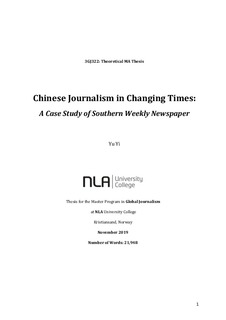| dc.description.abstract | The interplay of political and economic forces in shaping media has been a central discussion in the politcal economy of communication studies. Scholarly opinions differ from the role of state and market played in influencing media. Political economists mostly take the state and the market as antithetical forces in the media spectrum. This paper presents a content analysis of a Chinese national newspaper, Southern Weekly, and gives an examenation of its changes in two-time frames, 1993-1996 versus 2013-2016. The evidence demonstrates that when in an unflavored economic status, the market plays as an auxiliary force with the state, rather than a conflicting pole to defuse political intervention. The findings suggest that in a state formation like China, where journalism is facing tightening political control and enormous pressure, the theoretical presupposition of the state versus market model in the political economy of communication studies needs to be reconsidered. | |
